Live on the homepage now!
Reader Supported News
The article below is satire. Andy Borowitz is an American comedian and New York Times-bestselling author who satirizes the news for his column, "The Borowitz Report."
Gaetz, who appeared panicky and sweaty while talking to reporters, refused to reveal the identity of the payees, but said that he came to the stop-payment decision in the middle of Tuesday afternoon.
“In the past few days, I issued payments for, uh, a variety of antique birdhouses, which I have been collecting for many years,” the congressman said. “But now, on reflection, I realize I have way too many birdhouses. I am freaking lousy with birdhouses. That’s what those checks I wrote were for—unnecessary birdhouses.”
“Sometimes you make a decision that you think is going to turn out all right, and then you find out, no, it’s not going to,” he said. “God, I just hope I’m not too late.”
READ MORE 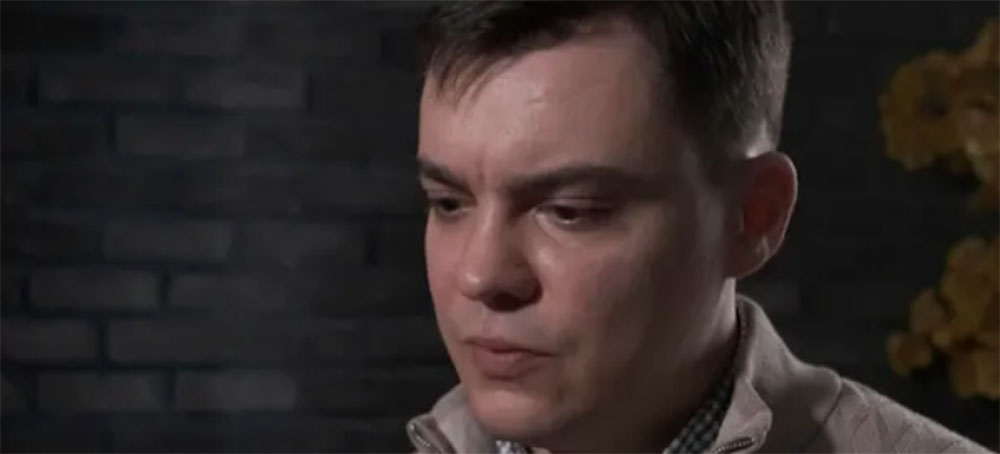 Gleb Karakulov pictured during an interview in Turkey in December 2022 from a video provided by the Dossier Center. (photo: AP)
Gleb Karakulov pictured during an interview in Turkey in December 2022 from a video provided by the Dossier Center. (photo: AP)
Former security officer tells of president’s strict quarantine and says he has ‘lost touch with the world’
Gleb Karakulov, who served as a captain in the Federal Protection Service (FSO), a powerful body tasked with protecting Russia’s highest-ranking officials, said the measures were designed to mask the whereabouts of the Russian president, whom he described as “pathologically afraid for his life”.
The 36-year-old said the train was used because it “cannot be tracked on any information resource. It’s done for stealth purposes.”
The Russian investigative outlet Proekt reported previously on the existence of the train and of a secret railway network including parallel lines and stations near Putin’s residences in the Valdai national park in Novo-Ogaryovo, and near his Bocharov Ruchei residence in the Black Sea resort of Sochi.
The Guardian has reviewed an interview with Karakulov by the Dossier Centre, a political information outfit founded by the exiled Russian billionaire Mikhail Khodorkovsky, and confirmed the credentials of the senior Russian communications engineer, who travelled with Putin extensively and helped transmit some of his most secret messages.
Karakulov was a member of the “field team” of the Presidential Communications Directorate that encrypts the messages of top Russian officials and estimated he had travelled on more than 180 trips with top officials. He appears to be the highest-ranking intelligence official to defect since the start of Russia’s war in Ukraine.
In the interview, Karakulov called Putin a “war criminal” and told fellow officers they should come forward with information being hidden from the Russian public.
“Our president has lost touch with the world,” he said. “He has been living in an information cocoon for the past couple of years, spending most of his time in his residences, which the media very fittingly call bunkers. He is pathologically afraid for his life. He surrounds himself with an impenetrable barrier of quarantines and an information vacuum. He only values his own life and the lives of his family and friends.”
Karakulov described a virtual state within a state that includes firefighters, food testers and other engineers who travel with Putin on his trips abroad, providing a rare first-hand insight into the levels of paranoia and sheltered lifestyle of the Russian president. “They call him the Boss, worship him in every way and only ever talk of him in those terms,” he said.
Karakulov also described setting up secret communications for Putin on planes, helicopters, lavish yachts and even in a bomb shelter at the Russian embassy in Kazakhstan during an October 2022 visit when Karakulov ultimately fled to Turkey and from there to an undisclosed country in the west.
He confirmed that Putin relies heavily for information on reports provided by his security services. Putin did not use a mobile phone or the internet, Karakulov said, and did not even bring an internet specialist with him on foreign trips. “He only receives information from his closest circle, which means that he lives in an information vacuum,” he said.
Putin is still in quarantine and requires all staff working in the same room as him to also undergo a two-week quarantine, severely limiting the number of people who have personal contact with him.
Karakulov said Putin used identical offices in St Petersburg, Sochi and Novo-Ogaryovo, and that the secret services used fake motorcades and decoy planes to pretend he was leaving. “This is a ruse to confuse foreign intelligence, in the first place, and secondly, to prevent any attempts on his life,” he said.
He said Putin’s behaviour and lifestyle had altered significantly since the outbreak of the coronavirus pandemic in 2020, when the president retreated from most travel and public appearances.
“He has shut himself off from the world,” Karakulov said. “His take on reality has become distorted.”
The interview did not give information on what messages Karakulov had encrypted for Putin or other top officials, or more information on Putin’s preparations for the war or strategy.
Karakulov described his risky escape to the west during Putin’s visit to Kazakhstan. During the trip, his wife and daughter secretly flew to Astana. They postponed the defection several times until nearly the end of the trip, when Karakulov told his fellow officers he was feeling unwell and then fled with his family to the airport. The Dossier Centre said Karakulov’s current whereabouts were unknown. The Guardian confirmed that Karakulov was listed as a wanted man in the Russian interior ministry’s public database of criminal suspects.
He claimed he had opposed the war on Ukraine since Russia launched its full-scale invasion in February 2022, but had waited to persuade his wife to flee together as a family. He said he had still not spoken with his parents, who were supporters of the war.
While the strict quarantine regime has fuelled rumours that Putin may be seriously ill and worried about complications from coronavirus, Karakulov said he had seen no indications that Putin was in poor health.
READ MORE  Wisconsin Supreme Court candidates Republican-backed Dan Kelly and Democratic-supported Janet Protasiewicz participate in a debate on March 21, 2023, in Madison, Wisconsin. (photo: Morry Gash/AP)
Wisconsin Supreme Court candidates Republican-backed Dan Kelly and Democratic-supported Janet Protasiewicz participate in a debate on March 21, 2023, in Madison, Wisconsin. (photo: Morry Gash/AP)
Judge Janet Protasiewicz’s win in Wisconsin is one of the biggest election results of 2023.
Jessie Opoien is the capitol bureau chief for the Capital Times and has covered Wisconsin politics for over a decade. We spoke about the race and what it means not just in Wisconsin but nationally.
This interview has been edited for length and clarity.
Ben Jacobs
Who is running in this race, and why is it getting so much attention?
Jessie Opoien
So the two candidates are Janet Protasiewicz, who is a Milwaukee County circuit judge, and Daniel Kelly, who is a former state Supreme Court justice. And although the race is ostensibly nonpartisan, it’s extremely influenced by partisan entities. So, again, Janet Protasiewicz is linked with Democrats and the liberal side of things. And Kelly is linked with Republicans and the conservative side of things. It’s getting so much attention because it’s one of the only huge races on a ballot anywhere this year because the ideological ballot balance of the state Supreme Court could flip in favor of liberals for the first time since 2008.
That could open the door to challenges to a number of policies that were passed by Republicans over the last 10 years. And I think, most notably, it would open the door to the court, looking at a challenge to the state’s abortion ban, which was passed in 1849 and had been unenforceable until the Dobbs decision.
Ben Jacobs
How much does redistricting come into play as well?
Jessie Opoien
Yeah, redistricting is the No. 2 issue on voters’ minds. At this point, I think abortion is definitely driving the race. The state has seen a number of challenges to its electoral map. I think it’s pretty widely agreed throughout the country that Wisconsin’s maps are among the most gerrymandered in the country. Janet Protasiewicz has certainly talked about those maps. She has said outright that they’re rigged. That’s something that the Kelly campaign has hit her on. But I think we could definitely expect, if she were to win, we could expect another challenge or a revival of one of the old challenges to make its way back to the court.
Ben Jacobs
Judicial races are nominally supposed to be nonpartisan. Is there any pretense at this point that this is removed from party politics?
Jessie Opoien
Not really; both of the candidates pretty much acknowledge that this is the way it works at this point. It’s kind of one of those things where, as a reporter, you have to note that it’s nonpartisan, and then explain that it’s really nonpartisan in name only. So I think both candidates are pretty well-linked to their respective political parties. We’re seeing both parties get pretty involved. It’s really just a difference between saying liberal and Democrat or conservative or Republican.
Ben Jacobs
So there’s a lot of money being spent in the race. How much is being spent, and who is doing it?
Jessie Opoien
Yeah, it’s huge. We’ve already surpassed the record for the most expensive judicial race in the country. ... We’ve already passed $20 million, and I’ve been hearing as high as $27 million. We are going to keep seeing that go higher and higher in the final days of the race. The Protasiewicz campaign is spending more than Kelly, who is relying a little bit more on outside groups. But we’re just seeing so much money flooding in from groups that have an interest in this race.
Ben Jacobs
You mentioned this has been a major ideological battle, but how much is this about the personalities of the two candidates?
Jessie Opoien
Yeah, I think this is probably the most that we’ve seen a judicial candidate talk about their personal values or their personal beliefs on the trail. We’ve definitely seen candidates do it in the past, but not to this degree. Janet Protasiewicz is very open about her support for abortion access and very open about believing that the maps are rigged.
Daniel Kelly isn’t out there with his personal opinions in that way. But you can certainly look at the work that he’s done in the past, and the fact that he’s worked with the Republican Party to get a sense of what his personal beliefs are. [Kelly and Protasiewicz] differ pretty strongly on whether it’s appropriate for a judge to share those beliefs. They both do acknowledge that judges are humans, and they do have beliefs. But yeah, I do think personality is coming into it a fair amount, at least in terms of just how much they’re willing to share of themselves or not.
Ben Jacobs
You mentioned that the big issue is the state abortion ban. Why is that an issue for the courts and not the legislature?
Jessie Opoien
So we have a Republican majority in the state legislature here that’s pretty well-entrenched, and will be for some time. And we have a Democrat in the governor’s office, which means [they are] kind of at an impasse on any changes to the state’s law. So the law that we have right now was passed in 1849, and it bans abortion in all cases, except for a pretty vaguely defined life of the mother exemption.
At the legislative level, some Republicans had said they would like to pass a bill adding exceptions for rape and incest cases; the governor, Tony Evers, has said he would not sign anything that keeps that ban in place. So that’s a no-go for him, even though it would loosen up the law a little bit. So nothing’s going to happen at the legislative level as long as the partisan balance remains what it is. In the meantime, the state’s Democratic attorney general has filed a lawsuit ... so that case is definitely going to make its way to the state Supreme Court. And it is likely the only way in the near future that we would see any changes to the state abortion policy.
Ben Jacobs
So at this point, is the only way anything major can happen is via the state judicial system and ultimately the state Supreme Court?
Jessie Opoien
Yeah, very much. So those of us who cover politics here, we have a saying of how a bill becomes a lawsuit. And that’s just how it works in a lot of cases here because it is the only way that you’re going to get an outcome that differs from that gridlock. In the past, when there was Republican control of all branches of government, that was the only way for Democrats to potentially challenge any of those things.
Ben Jacobs
So Wisconsin is a key swing state in presidential elections and has a Senate race coming up in 2024. Is there anything we can learn about 2024 from this election?
Jessie Opoien
I think on a practical level, you can’t ignore the possibility that the state Supreme Court will be involved in either the way those elections are run or potentially litigation afterward. If you look back at what happened in 2020, the state Supreme Court was pretty important in Donald Trump’s challenges to the outcome here. So that element of it, I think, is important.
I think Wisconsin is going to continue to be one of those top three to five states that people are paying attention to, and spending time on and pouring money into.
Ben Jacobs
Is there a broader lesson nationally from this as well?
Jessie Opoien
Wisconsin is somewhat interesting ... if you look at our state as a whole, it looks much redder than the other results would indicate. You’re seeing kind of liberal powerhouses in particular areas [of the state], but I think overall, just the closeness of the races here probably is a reflection brought more broadly of how closely divided the country is. I think seeing what works here — thus far, abortion has worked for Democrats and liberals. This might be a test, to find out how much [abortion] is going to continue to play in races throughout the country, depending on the outcome.
READ MORE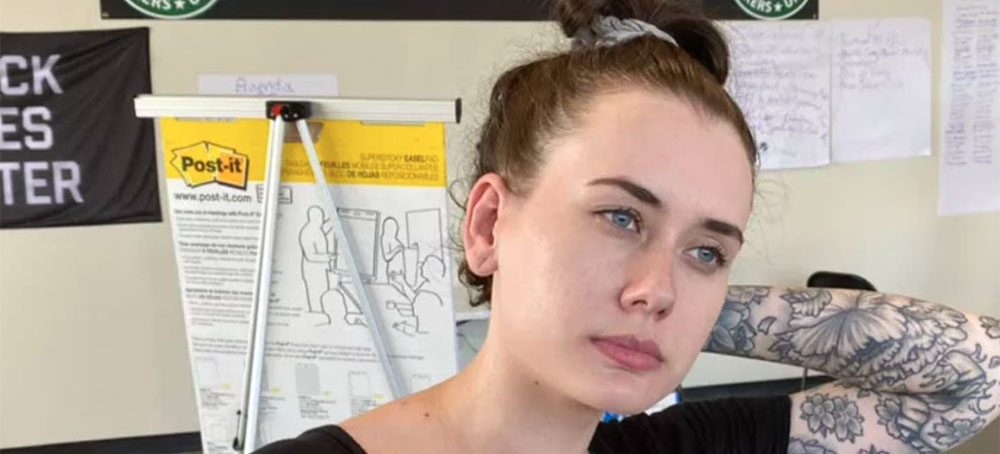 Lexi Rizzo. (photo: GoFundMe)
Lexi Rizzo. (photo: GoFundMe)
Lexi Rizzo led the campaign at a Starbucks in Buffalo that was one of the first to hold a successful unionization vote, launching a movement that has spread across the country and involved thousands of Starbucks workers.
Rizzo—who had worked for the company for seven years, according to a GoFundMe—was fired from her job as a shift supervisor on Friday, according to the Buffalo News.
Rizzo was canned for repeatedly being late to work, Starbucks told the outlet. The union, Starbucks Workers United, said Rizzo’s firing is “retaliation at its worst.” Two other pro-union workers were also fired, the union said.
“I have given every ounce of everything that I have to this company,” Rizzo said in an emotional video posted to TikTok, “My heart is broken.”
Rizzo went on to take aim at Schultz, who appeared before the Senate's Health, Education, Labor and Pensions (HELP) last Wednesday.
“You are a heartless monster and I don’t know how you sleep at night,” she said of Schultz, “You have hundreds of thousands of people giving everything that they have so that you can make another dollar. And then you treat us like we’re dirt.”
Democratic Senators confronted Schultz last week on eight rulings by administrative judges at the National Labor Relations Board (NLRB) that Starbucks had committed 130 labor law violations since the union campaign began in Buffalo in December 2021. Schultz denied that the company had violated the law.
Last month, a NLRB administrative judge found that Starbucks had committed “egregious and widespread" violations of labor law when it fired six pro-union workers in Buffalo and Rochester. The company was ordered to rehire and compensate the workers.
“Starbucks has waged the most aggressive and illegal union-busting campaign in the modern history of our country,” Sen. Bernie Sanders (I-VT) said as he opened the hearing. “That union-busting campaign has been led by Howard Schultz.”
READ MORE 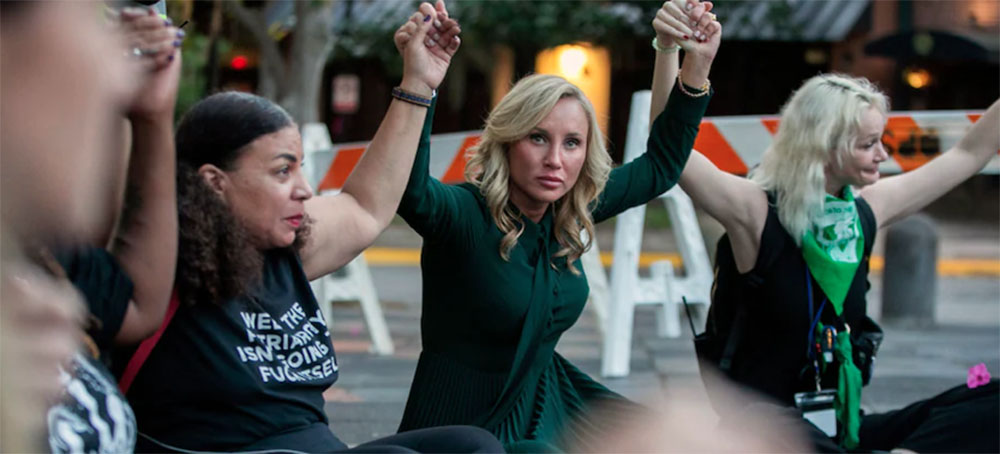 Sen. Lauren Book, center, holds hands with roughly a dozen activists Monday while protesting legislation that would ban abortions after six weeks in Florida. (photo: Alicia Devine/AP)
Sen. Lauren Book, center, holds hands with roughly a dozen activists Monday while protesting legislation that would ban abortions after six weeks in Florida. (photo: Alicia Devine/AP)
Fried tweeted late Monday that she had been released. It was not immediately clear whether the others had also been released.
The arrests came hours after the state Senate voted to approve a ban on abortion in most cases after six weeks, which is being described by activists as a near-total abortion ban. It is expected to be approved by the state House and Gov. Ron DeSantis (R) in the coming weeks, and would mark a shift from the 15-week ban DeSantis signed into law last year.
The legislation in Florida is one of several instances of Republican lawmakers across the country seeking to curb access to abortion since Roe v. Wade was overturned in June. Nearly a year later, abortion has been banned or mostly banned in more than a dozen states.
Book spoke passionately against the legislation on the Senate floor Monday. “In the course of just two generations, we’ve seen our rights won and lost. It is up to us to get them back,” she said. “No one is going to save us but ourselves.”
Tallahassee police said protesters were told they could not continue their demonstration after sundown and were arrested for trespassing after multiple warnings. “TPD encourages individuals exercising their First Amendment right of peaceful assembly to do so in accordance with the law,” the department said in a statement.
Anna Eskamani, a Democratic state representative from Orlando who was at the jail late Monday trying to help obtain the release of those who had been arrested, said it was “absolutely ridiculous” for people to be arrested while “peacefully protesting for abortion rights.”
“But Florida is where freedom goes to die, and that became even more evident tonight,” Eskamani said.
The demonstrations were relatively small; about a dozen people stood across the street from the Capitol with signs Monday morning, chanting “Abortion is health care!” and “Ron DeSantis has got to go!” as lawmakers and aides arrived for work.
A video from the evening, sent to The Post by Book’s team, shows demonstrators sitting in a circle singing “Lean on Me.” As officers pull them off the ground to put them in handcuffs, women can be heard shouting, “Shame, shame on you.”
Earlier Monday, some protesters were hustled out of the public gallery overlooking the state Senate chambers after they shouted over lawmakers’ speeches on the abortion bill. Some were forcibly removed; others yelled out criticism then left preemptively. After several disruptions, Senate President Kathleen Passidomo (R) ordered everyone out of the gallery.
“Bodily autonomy should not give a person the permission to kill an innocent human being,” Sen. Erin Grall, the bill’s sponsor, said on the floor. In a statement after the bill passed in the Senate, she called Florida “a nationwide leader in defending the rights of the unborn.”
DeSantis has been vague in public about what abortion restrictions he supports and has focused on other issues as he tours the country promoting his memoir and laying the groundwork for a likely presidential run. But when asked recently about the measure, he said, “I’m willing to sign great life legislation.”
Although tightening Florida’s abortion restrictions could help DeSantis in a GOP primary, many Republicans believe strict abortion stances hurt their candidates in last year’s midterms. In speeches over the weekend in Pennsylvania and New York, DeSantis made no mention of the abortion ban nearing passage in Florida.
Other states, including Georgia, have proposed similar so-called “heartbeat bans” that intend to restrict abortion around when fetal cardiac activity is detected.
According to a 2021 study from the University of California San Francisco, 1 in 3 people find out they are pregnant after six weeks and about 20 percent find out after seven. Restrictions after six weeks “disproportionately prevent young people, people of color, and those living with food insecurity from being able to access abortion,” the study’s authors wrote.
READ MORE 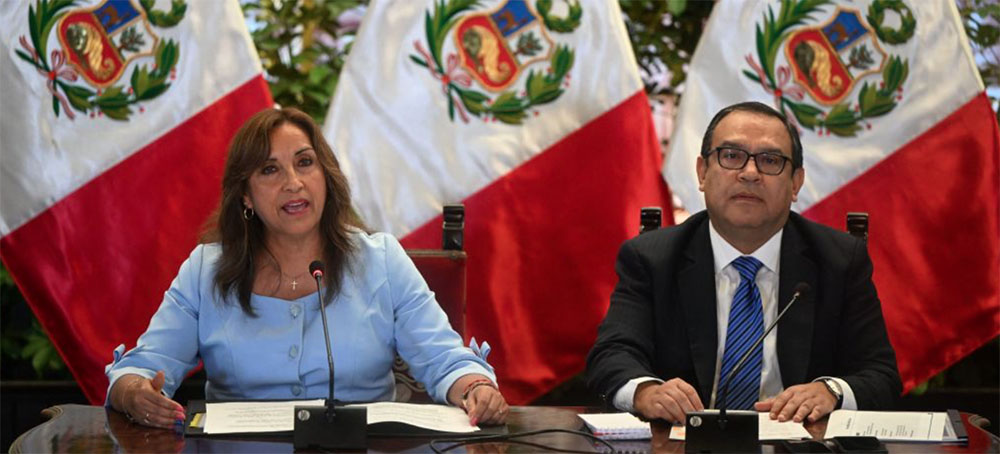 The Authoritarian Behind Peru's Massacring of Protesters
The Authoritarian Behind Peru's Massacring of Protesters
Over 60 Peruvians have now been killed at protests following the impeachment of Pedro Castillo. President Dina Boluarte and PM Alberto “the Butcher” Otárola must be brought to justice.
The quick ascent of Otárola began on December 7, when President Pedro Castillo, faced with another impeachment attempt by Congress, tried, without success, to dissolve the institution. The armed forces and the police didn’t back him, and once the impeachment went through, Vice President Boluarte assumed the presidency that same day. Instead of distancing herself from Castillo’s opposition, the new president would cozy up to right-wing and ultraright elements in government.
Otárola was part of the first cabinet of ministers in Boluarte’s administration, assuming the role of minister of defense. As the commander of the Peruvian Armed Forces, Otárola was directly responsible for the Ayacucho massacre carried out by the military on December 15, in which ten people were shot and killed. Despite clear human rights violations, Otárola, far from raising doubt in Boluarte, grew closer to the president. The cynicism with which Otárola justified the abuses of the armed forces paired with Boluarte’s total unwillingness to recognize said abuses, casting doubt over her capacity to lead as president.
From that point on, in every press conference, Otárola could be seen at Boluarte’s side, a reflection of how their relationship began. In 2022, as vice president and minister, Boluarte retained Otárola as her lawyer to defend herself against accusations of managing a private firm while occupying public office. For Boluarte, Otárola continues to occupy this role of squire.
But perhaps more surprising is the fact that Otárola at one point participated in leftist political movements, and that he used his expertise to defend human rights — the same rights now being crushed under his command. Otárola became minister of defense in the government of former president Ollanta Humala between 2011 and 2012, and remained active in Humala’s Peruvian Nationalist Party until 2021. In 2020, on the campaign trail, Otárola supported and defended one of the banner causes of the Peruvian left: the drafting of a new constitution by a constituent assembly. Now, however, he rejects the idea of a constituent process, currently one of the principal demands of protesters.
This is another key point that explains Otárola’s close relationship with Boluarte. Both have demonstrated volatile and unpredictable political commitments that they adapt according to their own benefit and political survival. They abandoned proposals for social reforms in order to embrace the initiatives of economic elites. They distanced themselves from progressive organizations to approach political forces of the ultraright. Having undertaken this transition together, Boluarte and Otárola strengthened their bond.
It’s thus no surprise that, on December 21 of last year, Boluarte named Otárola, largely responsible for one of the largest killings in recent years, chief of her cabinet of ministers. With this appointment, she confirmed that the violent government repression of protests wouldn’t diminish but increase in intensity.
And unfortunately, that’s just what occurred. On January 9 in Juliaca, in the Puno region, the current government carried out its second-largest massacre. Twenty lost their lives after being shot with bullets and other projectiles. Among those killed figured people who weren’t even participating in the protests.
That same day, Otárola gave his first address to the nation without the presence of President Boluarte. Diverging from previous lies about the protest movement, Otárola didn’t speak of violent groups staging protests but instead blamed former president Pedro Castillo of being behind them. Without expressing guilt or remorse for those murdered that day, Otárola asserted that the government would continue to respond to protests with the same resolve. Perceiving the callousness with which Otárola assimilated the murder of innocents, observers involved in the protests and on social media began referring to Otárola as “the Butcher.”
The Rise of a Civic-Military Regime
In its repression of protests and the opposition movement, the cabinet directed by Otárola has incorporated three classic components of civic-military regimes: the fabrication of an enemy from which the population must be protected, violent physical repression during protests, and the persecution and criminalization of citizens who oppose the regime.
The government’s explanations of the origins of the protests have been inconsistent, changing on at least five occasions. Boluarte and Otárola began by speaking of groups of criminals organizing the protests in order to loot. Then Otárola accused Castillo of having organized everything. Days later, the government spoke of a resurgence of Shining Path, a terrorist group that carried out attacks in the ’80s. Officials also pointed to foreign meddling and, based on a groundless publication of a Bolivian congressman, said that groups close to former Bolivian president Evo Morales were providing arms and organizing the marches. Finally, they accused illegal mining companies of financing everything. The government could not provide evidence for any of its hypotheses.
On the other hand, the violent repression of protests has been well documented in hundreds of videos. Police have used tear gas on peaceful marchers, mercilessly beaten subjects they encounter already incapacitated, and shot unarmed people that posed no threat. Furthermore, they’ve physically attacked journalists and street medics. Though mainstream media at the beginning attempted to conceal authorities’ unjustified killings, the evidence was overwhelming. Both national and international media investigations have now demonstrated the brutal repression of protests alongside authorities’ extrajudicial killings.
In addition to the brute repression of protests, the government has also persecuted and criminalized participants. Hundreds have been arbitrarily detained without evidence, held in cells for various days. These arrests have often occurred outside of protests, always justified under the rubric of “intelligence against violent actors,” but generally without any evidence supporting allegations of violence. Some of those arrested have denounced practices of torture and even sexual violence, having been forced to strip naked for searches in situations that didn’t merit such measures. Additionally, citizens’ footage has shown police planting evidence to justify arrests and detentions of protest participants. At the height of absurdity, they’ve detained and incarcerated people alleging that they financed subversive acts for carrying sums of cash less than $500.
Out With Boluarte, Out With Otárola
The situation in Peru is grave. Even as the arguments of Boluarte’s administration to justify its actions become more and more absurd, each day Otárola “the Butcher” appears to have more power, exhibited in the increasingly authoritarian actions of the current government. The bond between Boluarte and Otarola now seems based in the fear they share that, once out of power, they’ll have to face justice for their administration’s systemic violation of human rights.
That administration finds less and less support. The mainstream press cannot diminish its crimes and abuses, and some sectors of the Right have even come to view Boluarte’s presidency as unsustainable.
The United Nations sent a letter to the government on March 2, giving the executive branch sixty days to investigate and respond to the authorities’ excessive use of force and the deaths of protesters. And the attorney general of Peru has opened a preliminary investigation of Boluarte and Otárola for the crime of genocide, for which both were questioned. For its part, the US government, through its assistant secretary of state for western hemisphere affairs, has expressed its wish for Peru to move up elections.
Meanwhile, the majority of Peruvians, as they have clearly expressed in the streets and in polls, wish for the immediate resignation of Dina Boluarte — and with it, the fall and trial of the infamous first minister Alberto “the Butcher” Otárola.
READ MORE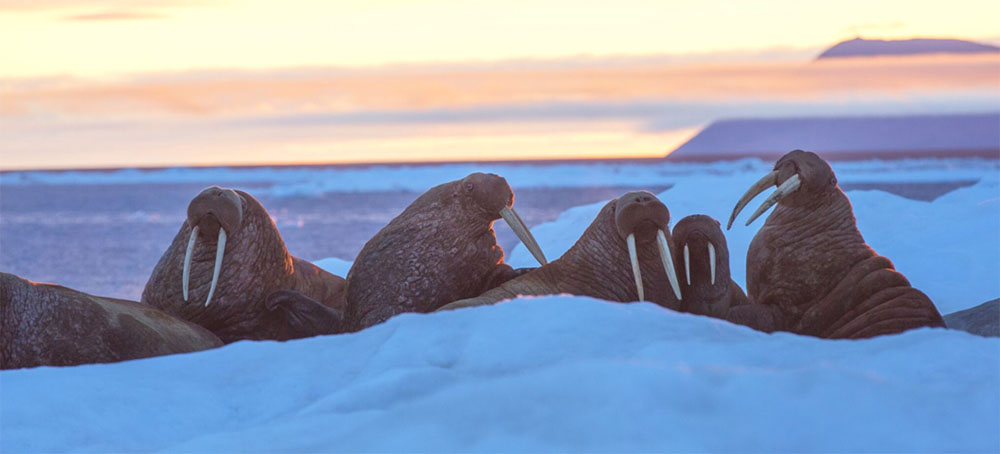 Pacific walruses rest on an ice floe in Russia. (photo: Sylvain Cordier/Gamma-Rapho)
Pacific walruses rest on an ice floe in Russia. (photo: Sylvain Cordier/Gamma-Rapho)
The short film “Haulout” forces audiences to confront the horrifying reality of what climate change means for Pacific walruses.
Chakilev stands, turns off the lamp and opens a door to the weak sunlight outside, revealing the source of the unfamiliar sounds: Pacific walruses. There are so many of them, and so tightly packed together, that the view through the cabin’s doorway is now only sea, sky and walruses.
What was a desolate Arctic beach has become a writhing mass of tusks, flippers and whiskers. Their huge bodies fill the door frame and tumble in roiling waves down toward the water. The walruses emit an almost prehistoric cacophony of grunts, groans and roars.
Absorbing this scene–which shows a 2020 walrus haulout in the remote Chukotka region of Russia–is like finding yourself trapped in the middle of a hostile invasion. The flimsy cabin is surrounded on all sides; there is no way out. In the haulout, thousands of animals hoist themselves onto land, risking trampling, because the Arctic sea ice where they normally rest before continuing on to feeding grounds is disappearing.
Filmmakers Evgenia Arbugaeva and her brother Maxim Arbugaev spent three and a half months living with Chakilev on this isolated shoreline, called Cape Serdtse-Kamen, in his tiny, sparse hut, observing him as he observes the walruses. The haulout in 2020 lasted for nearly three weeks in total, the longest Chakilev had yet documented in his 10 years of studying it.
“I felt that I was in the film ‘Lord of the Rings,’ and there was the army of orcs,” Arbugaeva told NPR’s The Pulse in an interview about witnessing the haulout firsthand. “It was scary.” The walruses’ size, numbers and their guttural, chainsaw barks might make them seem like an angry horde, but Arbugaeva was not afraid of the walruses; she was afraid for them.
“It was scary because they’re not aggressive animals, especially when they’re on the beach. They’re really vulnerable, and they’re so easily scared,” she said. “You could hear the animals struggling. You could hear some high-pitched voices of cubs that are looking for their mothers.” During the haulout, Arbugaeva said, they couldn’t use the stove or generator in the cabin because the smoke and noise could spook the walruses, inciting panic and stampedes.
As the film progresses, it becomes clear that what you’re watching is not so much a horror movie as a tragedy. The dangerous overcrowding of the haulout is the direct result of climate change, we learn in the closing minutes of the film. Chakilev estimated that there were 100,000 walruses gathered at the haulout’s peak in the fall of 2020.
“Walruses rely on sea ice to rest during feeding and migration,” text in the film explains. Melting ice forces the walruses “to spend more time on land, where they are at risk of stampedes and trampling.” The animals in this film are exhausted, suffering and frightened, and far more trapped by their circumstances than the humans are. Six hundred walruses died in the 2020 haulout, a record to match the one set that earlier year for the hottest temperature ever measured in the Arctic.
During the haulout, several walruses try to squeeze into the cabin, their bulk straining against the thin walls. Adult Pacific walruses can weigh as much as 2,000 pounds, but Chakilev gently shoos the visitors outside with a broom. “One at a time,” he says to them as they shuffle out. A wounded cub, who has somehow wriggled into an adjoining room, stares at the camera with pain in its eyes, looking not unlike a lost puppy.
“That was a very difficult situation, because this cub got stuck in the hut. It was injured, and it was just slowly dying,” Arbugaeva said, in an interview with the film podcast Top Docs. “There was nothing we could do. We couldn’t just put it back in the sea of walruses where he would be suffocated right away. All this time, I’m thinking, what can I do?” Chakilev told her to let the walrus “die in peace,” but Arbugaeva struggled. “That was hard to watch,” she said.
When the haulout is over, and the walruses have receded like a tidal wave, Chakilev walks along the water’s edge, examining the bloated corpses left behind like a detective cataloging the casualties of a massacre. He stops at the body of a walrus with a cub beside it. “Female, six to nine years,” he says into an audio recorder. “Died about five to seven days ago. And a calf. Died recently.” But then the smaller walrus moves, laying its muzzle on top of the older walrus’ back. It looks up at Chakilev from the sand, and he corrects himself. “No, alive,” he says. “Very weak. An orphan.” As he leaves, the baby swims a few feet into the surf, bobbing and alone.
The more you understand about what is going on, the more difficult it is to keep watching “Haulout.” The voices of the walruses no longer seem intimidating, only desperate. The threat that global warming poses to Pacific walruses has been recognized by official agencies like the U.S. Fish and Wildlife Service and the Marine Mammal Commission, but they are not currently listed as an endangered species, something that conservation groups want to change. Arctic sea ice is now shrinking at a rate of 12.6 percent per decade, and a 2022 report predicted that there will be no summer sea ice left in the Arctic by 2050. Arbugaeva has said that she and her brother hoped to convey to audiences the truth about the walruses’ fate.
“We made this film because we wanted to show people what really is happening in the Arctic, and we wanted to make it in the way that is not heavily message-driven or narrated,” she told NPR. “We wanted people to see for themselves that this is the reality that animals in the Arctic are facing, and that we need to do something about it.”
By the end of the film, as Chakilev closes up the hut for the season and trudges out through a blizzard, that uncomfortable reality—and our own complicity in its perpetuation—becomes undeniable. “Haulout” is a horror movie after all, although not in the way it seems at the outset. The monster isn’t growling outside the door, threatening to break in. The monster is us.
Follow us on facebook and twitter!
PO Box 2043 / Citrus Heights, CA 95611



No comments:
Post a Comment
Note: Only a member of this blog may post a comment.